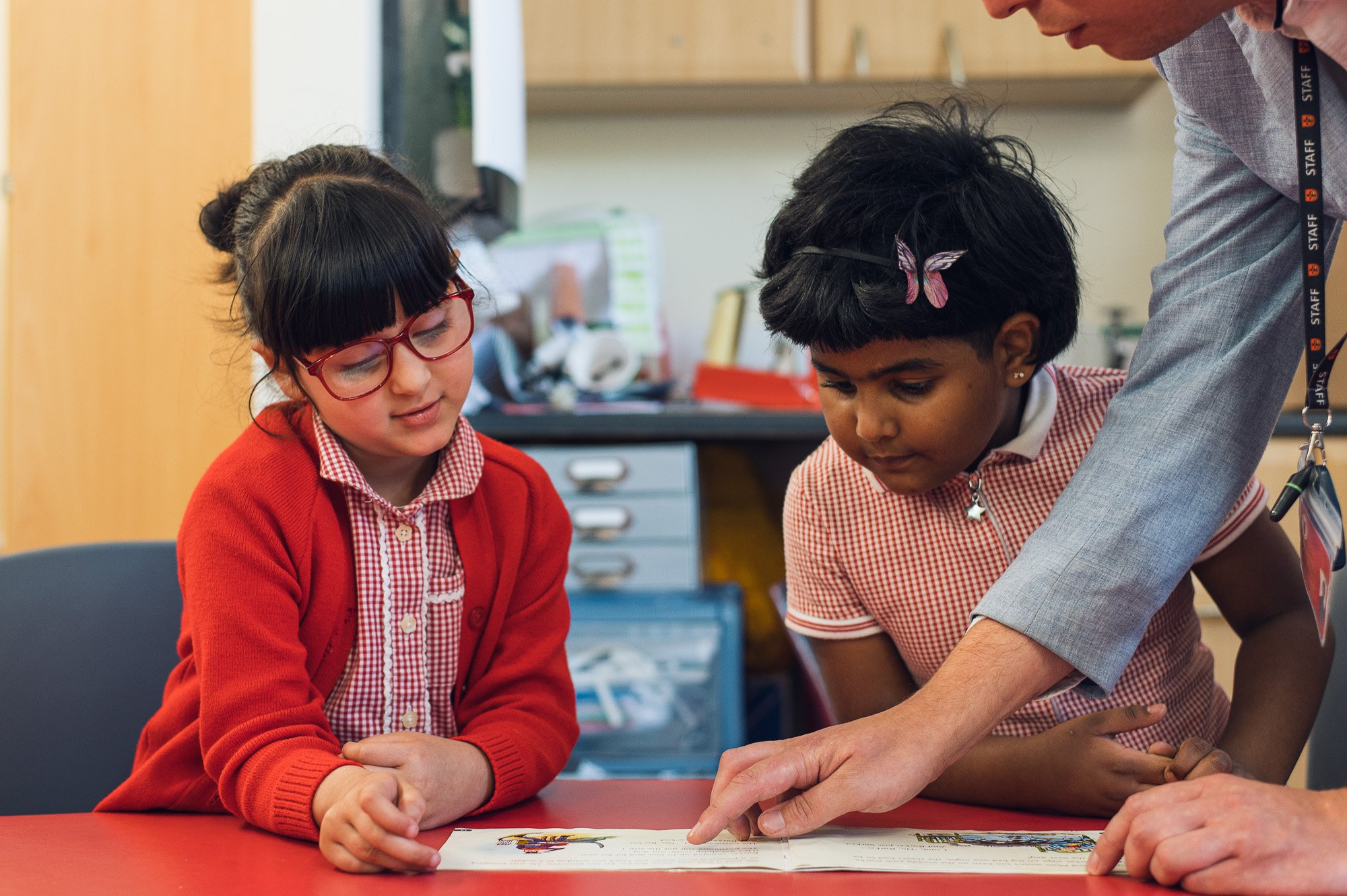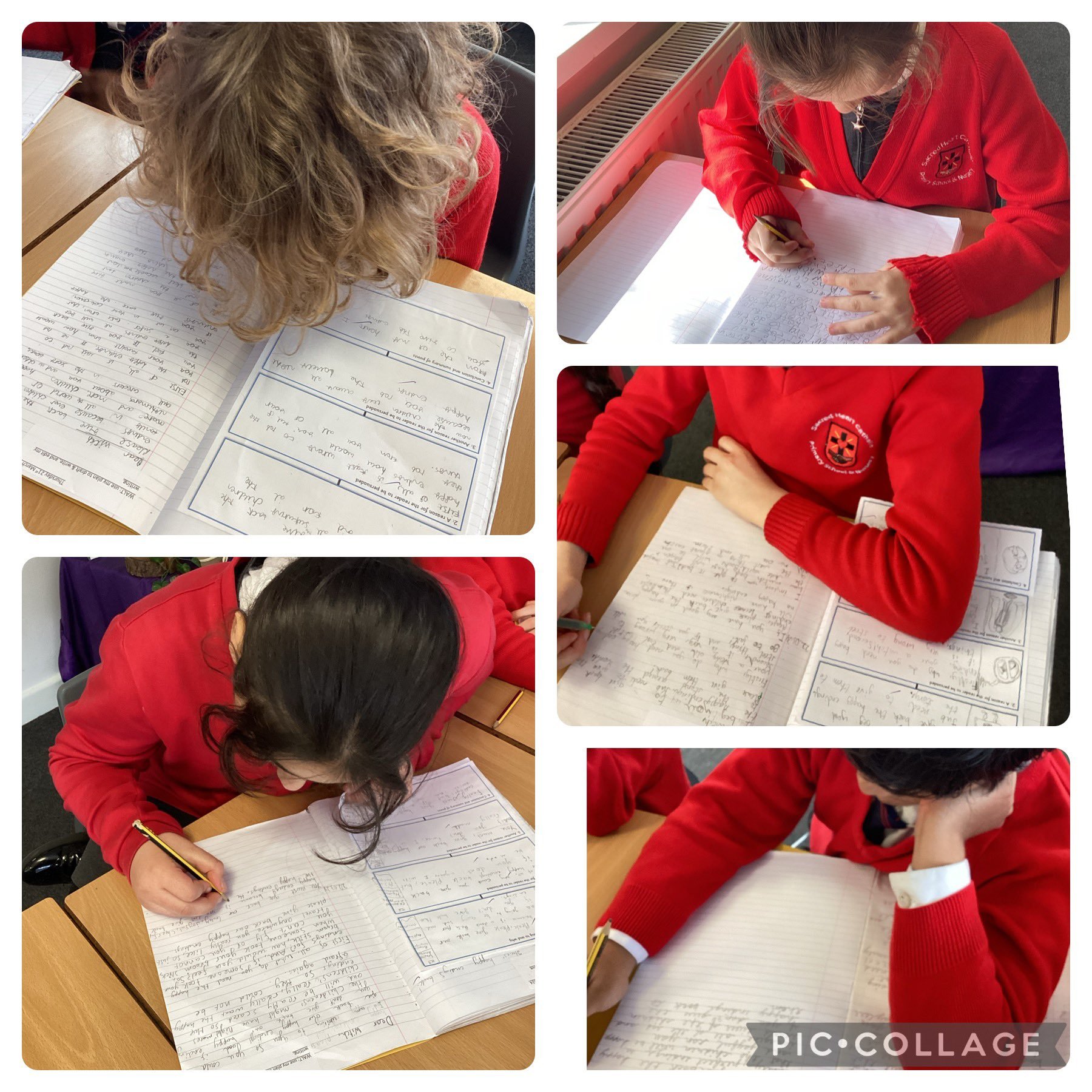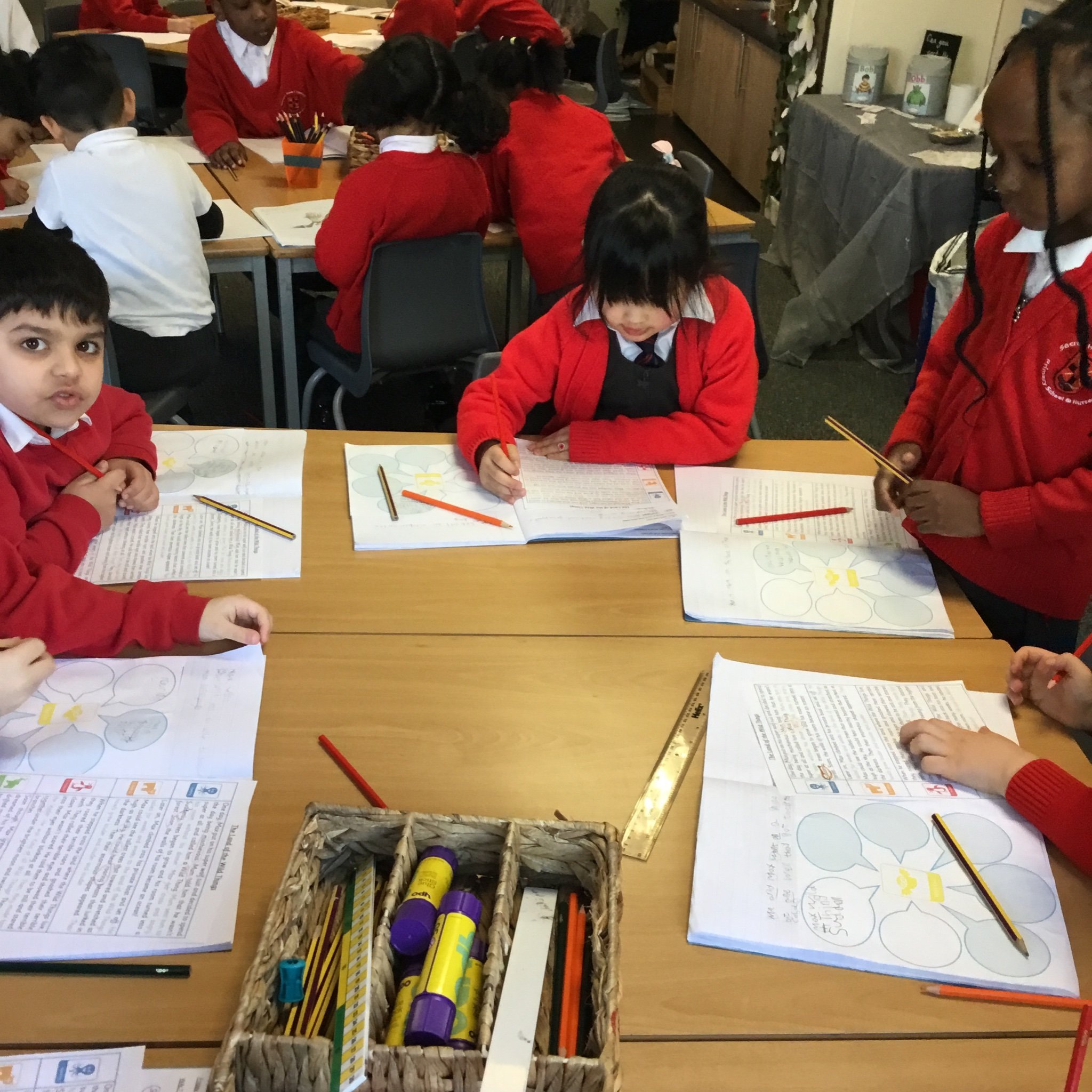
English
English
at Sacred Heart Primary School
Intent
At Sacred Heart Catholic Primary School, English and the teaching of English is the foundation of our curriculum. Our main aim is to ensure every single child becomes confident and primary literate and progresses in the areas of reading, writing, speaking and listening.
Staff at Sacred Heart feel it is essential to highlight and be aware of the differing groups of learners in their class. Teachers can plan and teach personalised English lessons which focus on the particular needs of each child. We recognise that each child has their own starting point upon entry to every year group and progress is measured in line with these starting points to ensure every child can celebrate success.
English at Sacred Heart will not only be a daily discrete lesson, but is at the cornerstone of the entire curriculum. It is embedded within all our lessons and we will strive for a high level of English for all. Through using high-quality texts, immersing children in vocabulary-rich learning environments and ensuring new curriculum expectations and the progression of skills are met, the children at Sacred Heart will be exposed to a language-heavy, creative and continuous English curriculum where reading and writing are intrinsically linked. This will not only enable them to become primary literate but will also develop a love of reading, creative writing and purposeful speaking and listening.
At Sacred Heart, our vision is for creativity to be at the helm of our English curriculum and for children to learn new skills in an ambitious, relevant, fun and engaging way.
Implementation
From Year 1 to Year 6 children take part in Whole Class Reading sessions that are based on a chapter book. In the sessions children complete activities based on inference and deduction, retrieval and vocabulary.
Alongside this, the teachers read a wide range of stories, poetry and non-fiction to pupils; they are soon able to read these texts for themselves. Embedding the alphabetic code early on, means that pupils quickly learn to write simple words and sentences. We encourage them to compose each sentence aloud until they are confident to write independently. We make sure they write every day. Pupils write at the level of their spelling knowledge. The quality of the vocabulary they use in their writing reflects the language they have heard in the books the teacher has read to them; they have also discussed what the words mean.
EYFS
Children will use communication, language and literacy in every part of the curriculum, are encouraged to read, and speak to express their ideas. Classes will have a well-organised and well-stocked writing area. Puppets and small world should be available for role-play. The outdoor environment also provides opportunities to read, write and role-play. There are activities to help develop children’s gross and fine motor skills. Children will be taught at the appropriate stage of Read, Write Inc phonics during daily phonics lessons. There are also regular literacy-based activities which are supported by independent and adult-directed activities. In Reception children are taught daily phonics lessons linked to our Read Write Inc. phonics scheme (see separate policy), they are taught daily English and shared reading lessons.
Key Stage 1
In Key Stage 1, children will be taught daily English lessons of approximately 50-60 minutes, daily Phonics session linked to our Read Write Inc. Phonics Scheme (see separate policy) and daily guided reading lessons. Morning Tasks may be linked to: Spelling and Handwriting, Daily Phonics/Spelling, Weekly Handwriting sessions; these are additional to the English lessons within Key Stage 1.
Children are encouraged to build on their own positive experiences of communication, language and literacy from EYFS. They will learn to speak confidently, listen to what others have to say and begin to write independently with enthusiasm. They should use language to explore their own experiences and imaginary worlds. Children will continue to be taught at the appropriate stage of Read, Write Inc. phonics until they are secure and ready to progress from the program. Teachers use the National Curriculum, alongside units of work provided by The Literacy Company, to ensure coverage of the National Curriculum objectives. Children have the opportunity to work in small groups and independently within English lessons as well as in Foundation subjects. Classes have a working wall that should support learning with models, examples of work and key vocabulary.
Key Stage 2
In key stage 2, children will be taught daily English lessons of approximately 50-60 minutes, daily Guided Reading sessions, weekly spelling/grammar sessions. Morning Tasks linked to: Spelling and Handwriting, Weekly Handwriting session; these are additional to the English lessons within Key Stage 2.
Children are encouraged to build on their own positive experiences of communication, language and literacy from Key Stage 1. Children will have the opportunity to experience more challenging texts and use these as a model for writing. Children will write with increased independence. Children will be taught spellings ensuring coverage of all statutory requirements. Teachers use the National Curriculum alongside units of work provided by The Literacy Count’s Ready Steady Write to ensure coverage of National Curriculum objectives. Children have the opportunity to work in small groups and independently within English lessons as well as in Foundation subjects. Classes have a working wall that should support learning with models, examples of work and key vocabulary.
Impact
At Sacred Heart, through discussion and feedback, children talk enthusiastically about reading and writing and understand the importance of this subject. They can also talk about books and authors that they have enjoyed and can make reading recommendations.
Children are taught reading and writing progressively and at a pace appropriate to each individual child. Teachers subject knowledge ensure that skills taught are matched to National Curriculum objectives.
We believe that pupils will:
· acquire skills which will equip them to progress from their starting points, and within their everyday lives.
• be confident in the art of speaking and listening and to be able to use discussion to communicate and further their learning
• be able to read fluently both for pleasure and to further their learning.
• enjoy writing across a range of genres
• have a wide vocabulary and be adventurous with vocabulary choices within their writing
• have a good knowledge of how to adapt their writing based on the context and audience
• leave primary school being able to effectively apply spelling rules and patterns they have been taught
• make good and better progress from their starting points to achieve their full potential Pupils of all abilities will succeed in all English lessons because work will be appropriately adapted.
Reading
We have a systematic, synthetic approach to teaching phonics in EYFS and KS1 following the RWInc programme. We place great importance on speaking and listening in our Early Years and we teach different aspects and levels of phonological awareness in our Nursery provision. We focus on sound discrimination, rhythm, rhyme, oral blending and segmenting, sound talk and enhancing our children’s vocabulary.
We follow a text-based learning approach during English lessons. Core Texts have been chosen for each year group but there is scope for change if the children show an enthusiasm for a particular event, subject or interest. A wide range of effective questioning will be used during class discussions to challenge, probe and extend children’s understanding and learning. We analyze the text either responding in writing or completing some explicit vocabulary teaching using words from the text. Teachers model writing objectives during whole class teaching and Guided writing sessions will be used to meet specific objectives for individuals or groups. Opportunities will be provided to reflect and edit their work whilst drafting – teachers gauge when these times are best. Opportunities will be given to act on feedback. In years 1 – 6 teaching will take place as a daily lesson but in Foundation Stage elements may be taught throughout the day. High standards and general English subject knowledge will be reinforced continually throughout all subjects.
Spellings are to be taught in separate spelling sessions but also continuously throughout the school day across all subjects. All children are to be taught their year group word list, whilst also revising previous year’s lists. Through RWInc lessons in KS1 and spelling sessions in KS2, children are to be taught their year groups spelling patterns. We have additional streamed RWInc fast track intervention for children where extra support is required throughout KS1 and 2 (e.g. those children who did not pass the Year One phonics screening test or the resit in Year 2 or those that we feel could benefit to reach their potential).
Handwriting
All children in EYFS are taught to hold a pencil correctly and form all letters correctly. From year 2, children are expected to join up their writing. All staff should model the handwriting cursive script when they write for any purpose within the classroom. All children should be expected to write in this style of handwriting whenever they write, in all subjects. From Summer term in Reception, the children are to use English books containing tramlined handwriting paper. This will continue throughout Years 1 and 2 and until the children are forming their letters correctly (ascenders and descenders correctly formed). Children will then progress onto normal lined English books when their handwriting and presentation is at the expected standard for their age.
Writing - including Grammar, Puntuation and Spelling
In line with the new national curriculum, we ensure that each year group is teaching the explicit grammar, punctuation and spelling objectives required for that age group. As well as teaching the objectives, teachers are able to embed the skills throughout the year in cross-curricular writing opportunities and aim for all children to achieve the objectives at the expected level and that some children can achieve at a greater depth standard. In this sense, assessment of writing is also more fluid as teachers can assess against a set framework. All year groups use the same format for assessing writing, reading and GPS, which have been produced in line with the end of Key Stage assessment frameworks as published by the Department for Education. We record our assessments and track progress on our OTrack system.
In order to expose children to a variety of genres which helps to utilise and embed the writing skills, teachers use a variety of recommended texts to plan, structure and teach their English lessons. This plan is designed to show progress, teach the pertinent year group objectives, apply and consolidate these skills and develop vocabulary. Writing is taught through the use of a quality text, which exposes the children to inference, high-level vocabulary, a range of punctuation and characterisation. Each text is purposefully selected in order to promote a love of reading, engagement and high quality writing from each child.
Speaking and Listening
By the time our pupils leave Sacred Heart we aim for our children to be confident, fluent speakers who are able to use a wide range of adventurous and ambitious vocabulary in the correct context. We aim for our pupils to give well-structured descriptions, explanations, presentations and narratives for different purposes, including for expressing feelings. Our pupils will make reference back to their original thoughts when their opinions have changed and give reasons for their change of focus. They will maintain attention and participate actively in collaborative conversations, staying on topic and initiating and responding to comments with confidence. They will be able to consider and evaluate different viewpoints, adding their own interpretations and building on the contributions of others.
We aim for our pupils to become good listeners who can follow instructions and ask and answer thoughtful questions in all lessons to further develop their knowledge, skill or understanding.
Teaching and Learning in English
Our teaching and learning strategy in English at Sacred Heart l is based upon the 2014 National Curriculum for English. We teach children by year groups, although we do differentiate tasks to suit pupils who are working below (or above) age-related expectations. This will enable those pupils to develop basic skills, as well as their confidence and independence at a more manageable pace. We have also identified those pupils who would benefit from additional English support and they follow interventions such as Racing to English, Pathways to Progress, ‘bag time’ activities in both Nursery and Reception, Project X, Fresh Start, Fast Track phonics , One to One reading and phonic support and Listening Skills.
Reading and Writing is not only celebrated in classrooms at Sacred Heart, around school you will find displays which celebrate authors, children’s favourite books and children’s work based upon texts. In addition, throughout the school year the importance of reading is enhanced through World Book Day, author and poet visits, parent reading workshops and a range of trips and visits which enrich and complement children’s learning. We use high quality texts for days such as Black History Month, Friendship Week, Refugee Week, World Mental Health Day and Science Week.
As we believe consistency and well-taught English is the core of a valuable education, at Sacred Heart we ensure that the teaching of reading and writing is purposeful, robust and shows clear progression for all children.
As all aspects of English are an integral part of the curriculum, cross curricular writing standards have also improved and skills taught in the English lesson are transferred into other subjects; this shows consolidation of skills, progression and a deeper understanding of how and when to use specific grammar, punctuation and grammar objectives. We hope that as children move on from us to further their education and learning that their creativity, passion for English and high aspirations travel with them and continue to grow and develop as they do.
It has always been our aim at Sacred Heart to create a love for Reading and Writing, and understand that is not just a subject, but a life of opportunities.
English in Action
Overview and Progression Maps


















